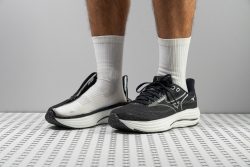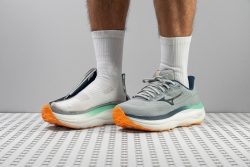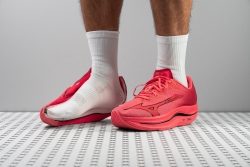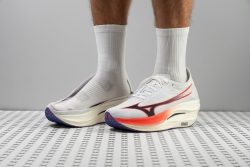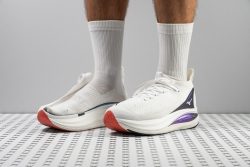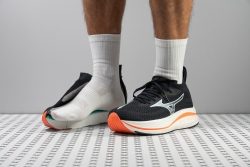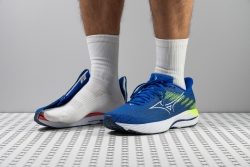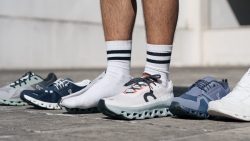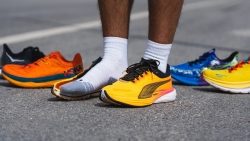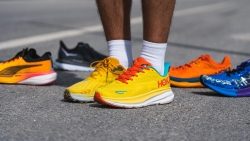7 Best Mizuno Running Shoes in 2025
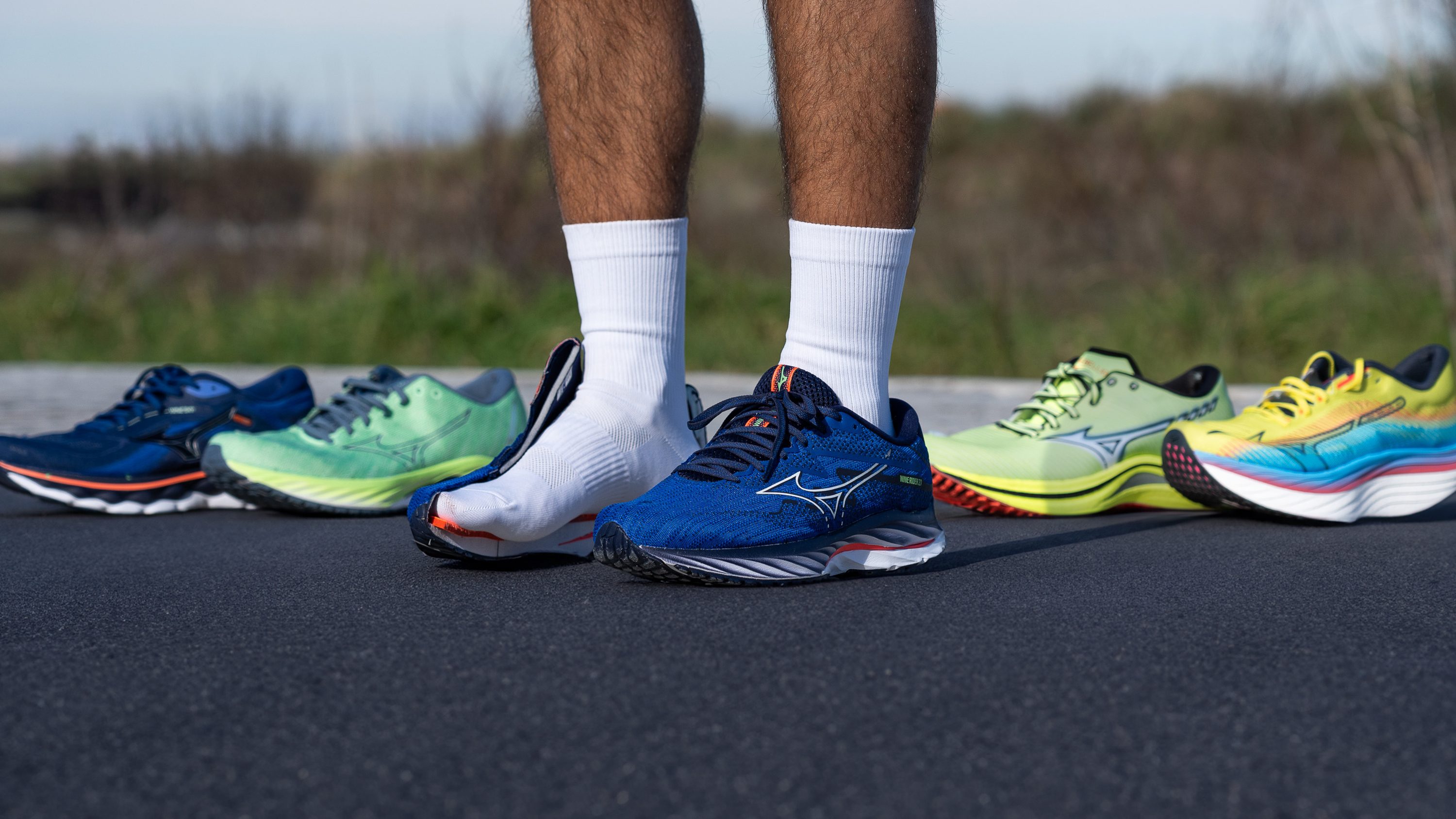
We buy shoes ourselves. We earn commissions when you buy through us, at no extra cost. Why trust us
Mizuno has always been known for their durable, long-distance running shoes. But because we know that different runners need different shoes, we’ve selected some of the best choices from different categories and we based our decisions on our test runs and lab tests.
Whether it’s for flat feet, premium cushioning, or just the best Mizuno shoe overall, we’ve got our top picks ready for you.
How we test Mizuno running shoes
We’ve tested tonnes of Mizuno shoes to pick the greatest. We start with buying the shoes and end with publishing the reviews that combine our experience with the shoes and our lab data:
- For transparency, we pay for the shoes with our own money. We don't want any brand telling us what we're allowed to publish or what we must write.
- Our runs with each pair are done in varying conditions. We take them to roads and trails, and we assess their comfort, durability, fit, and overall performance.
- We take the shoes to the lab where we use our lab tools to test and measure the shoe's flexibility, energy return, platform width, outsole thickness, breathability, durability, etc.
- We then cut Mizuno running shoes into pieces. This allows us to measure the heel stack height and forefoot stack height accurately and to stick the durometer into the foam - the only way to properly measure the softness of the foam.
Best Mizuno running shoes overall
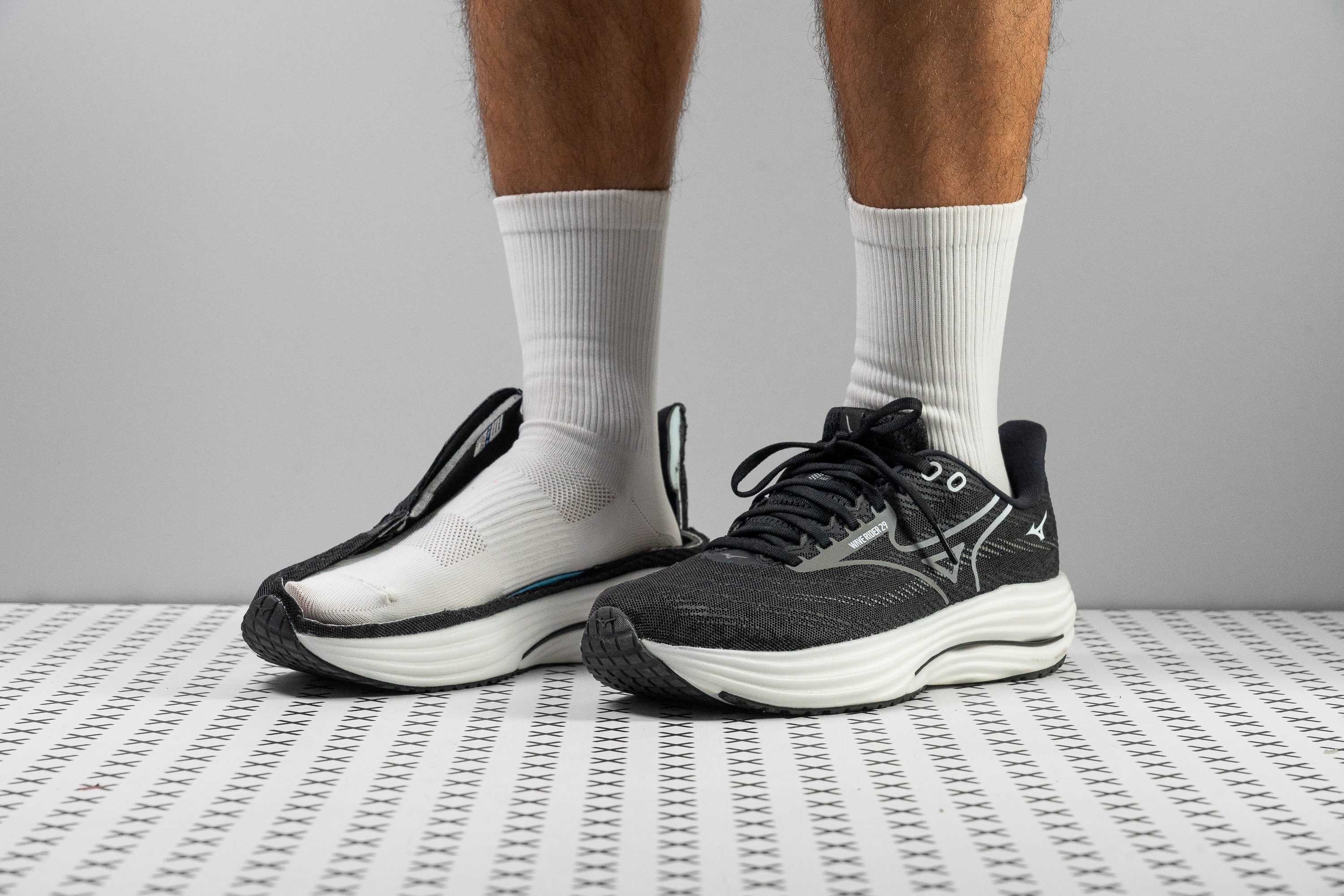














































What makes it the best?
The Mizuno Wave Rider 29 has a well-cushioned platform that securely delivers stability through its Wave plate, which we saw in the lab. On foot, it feels very comfortable, especially since it bends easily with our feet and maintains a light figure, boosting its versatility. We find it to be a highly reliable workhorse, making it our best Mizuno running shoe.
The midsole features a generous 37.5 mm heel for cushioned landings, with comfort driven by impressive shock absorption levels of 142 SA in the heel and 116 SA in the forefoot. To enhance stability and responsiveness, the Wave plate offers subtle support.
Speaking of the Wave plate, it promotes steady and smooth transitions without stiffening the ride. In our bend test, we’re surprised to find it needs a near-average 15.8N to reach 30 degrees, making it a great companion for multi-hour runs and activities like walking.
Its no-fuss persona is further verified when we placed the shoe on our scale. At 9.1 oz (258g), it’s lighter than the average running shoe.
We found this shoe ideal for easy and relaxed days. Those who prefer a more dynamic ride should go for shoes with higher energy return scores.
Pros
- Softer Enerzy NXT midsole
- Improved shock absorption
- Works well for wide feet
- Finally lower drop!
- Classic feel with minimal rocker
- Lighter than predecessor
- Solid overall durability
- Excellent fit and heel lockdown
- Impressive stability
Cons
- Price increase
- Ride is not very exciting
- New drop can disappoint longtime fans
- A bit stiff
Best Muzino running shoes for daily training
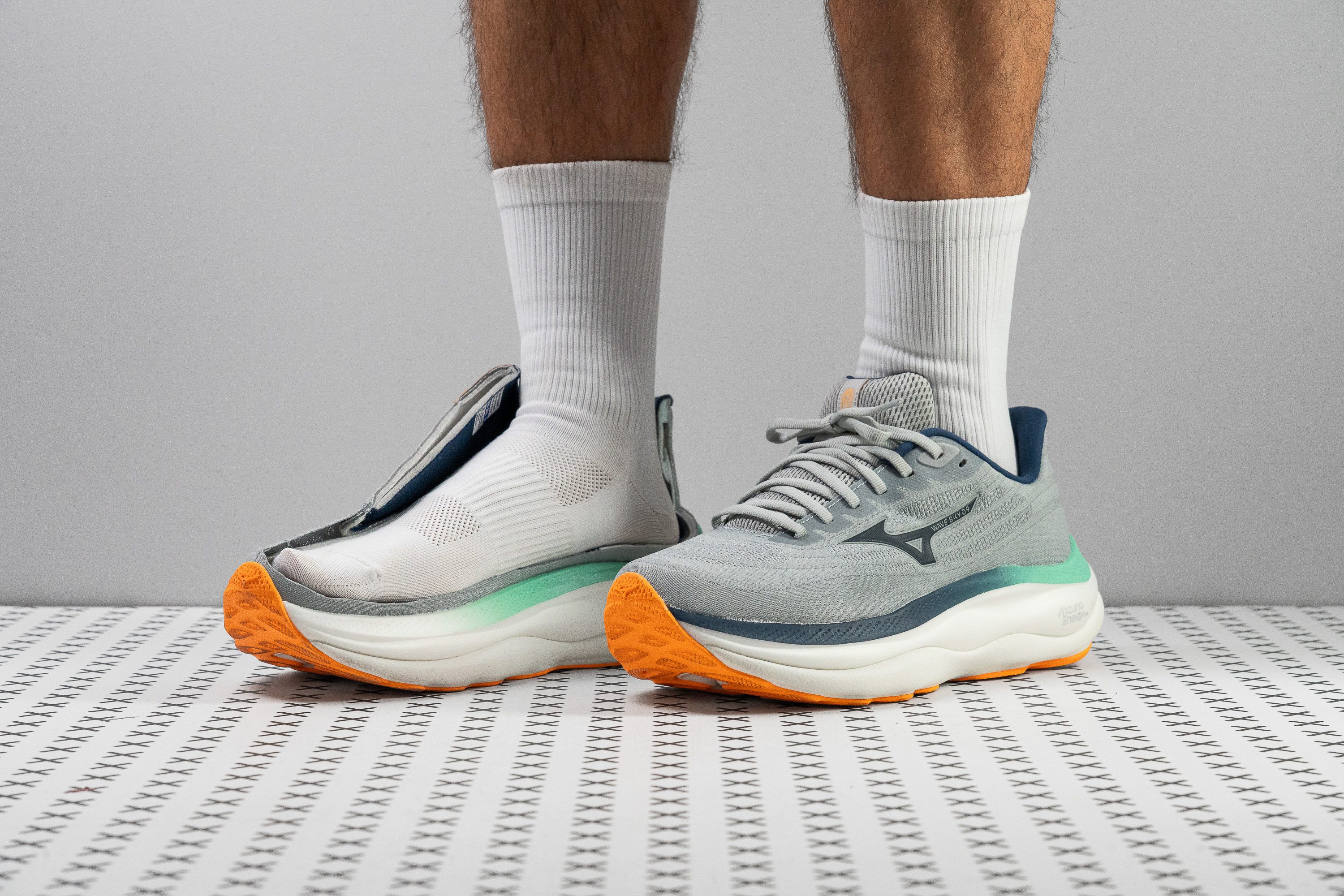
















































What makes it the best?
We tested Mizuno running shoes in and out of the lab and found the Wave Sky 9 as the perfect companion to gobble up the miles without leg fatigue. Lab tests show the numbers, but our feet can confirm it’s Mizuno’s best daily trainer because of its ultra-soft, cloud-like cushion, strong ventilation, and durable build.
Our calliper reveals a sky-high 44.3/38.1 mm stack, much taller than the 34.8/26.2 mm average. It has generous cushioning for us to finish long runs comfortably. Given its 6.2 mm offset, it’s more suitable for midfoot and forefoot runners. Testing for the forefoot’s ability to reduce impact, we recorded a strong shock absorption score of 145 SA, making it 36.8% more protective than average.
The Smooth Stretch Woven upper feels plush yet airy. In our smoke test, a steady stream of vapour escaped, so we gave it a solid 4/5 in breathability. Surprisingly, the strong ventilation doesn’t affect its wear resistance. It withstood our Dremel test bravely, earning a remarkable 4/5 score. Even the inner lining emerged untouched, earning the maximum 5/5 durability score.
However, because of its plush and stacked midsole, this shoe is only suitable for neutral runners. Those looking for extra support should check stability shoes.
Pros
- Premium-level shock absorption
- Soft midsole
- Ideal for forefoot/midfoot strikers
- High quality upper
- Excellent grip even on wet
- Unmatched overall comfort
- High breathability
Cons
- Overpriced for a daily beater
- Downgraded energy return
- Stiff midsole for a daily trainer
Best Mizuno running shoes for tempo workouts
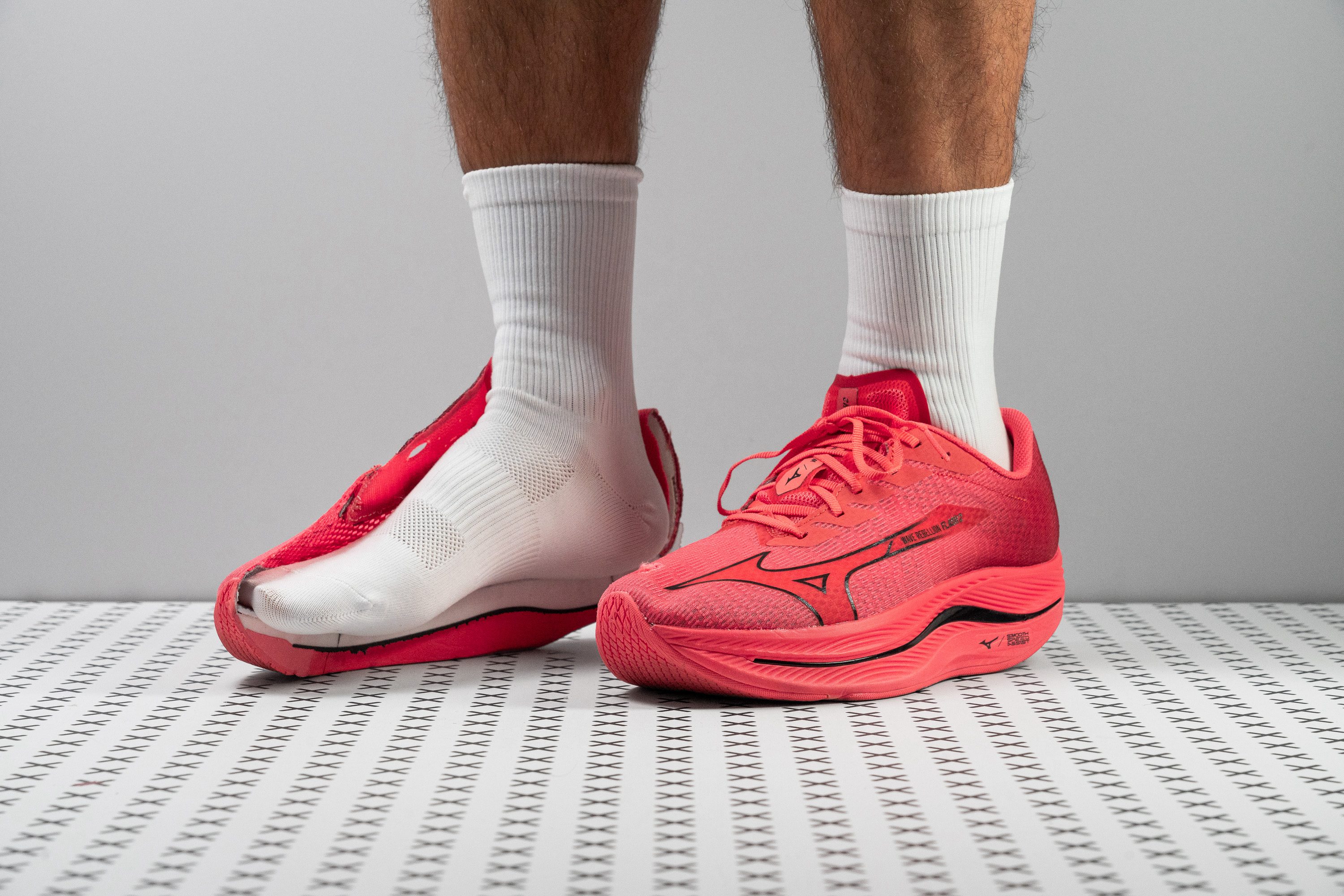


















































What makes it the best?
The Mizuno Wave Rebellion Flash 2 is a speedy shoe with a unique geometry and underfoot sensation. Our lab tests validate its electric persona through its energetic midsole and Wave Plate, without sacrificing comfort. Its light build and awesome impact protection made our runs more enjoyable, making it our best tempo Mizuno running shoe.
WRF2 infuses power with each stride, courtesy of the bouncy cushioning, which our lab test shows has a high energy return rate of 59.6% in the forefoot. Meanwhile, the Wave Plate nestled in the midsole offers some responsiveness without the rigidity.
Our feet couldn’t deny its effortless feel, and our bend test shows it needs a near-average 15.8N to reach 30 degrees. That’s actually quite forgiving for a plated shoe, making it compatible for training sessions. Additionally, its weightlessness is enhanced by its actual low 8.4 oz (239g) figure, 9.8% below average.
With every takeoff, a divine cushioning awaits. In our shock absorption test, WRF2 scored an impressive 148 SA, meaning it’s able to absorb impact 16.5% better than average, keeping our legs fresh.
Unfortunately, our confidence fades during rainy days. With a subpar 0.42 traction score, we recommend using this pair on dry pavements.
Pros
- Unique rockered geometry delivers a fun ride
- Fantastic choice for midfoot strikers
- Fibreglass plate balances flex and propulsion
- Good fit for most feet
- High-stack forefoot for cushioned landings
- Reflective details enhance safety at night
- Can handle workouts and daily runs alike
- Can handle workouts and daily runs alike
- Can handle workouts and daily runs alike
Cons
- Absolutely not for heel strikers
- Non-removable insole
- Upper durability concerns
- Enerzy foam lacks bounce
Best Mizuno running shoes for racing
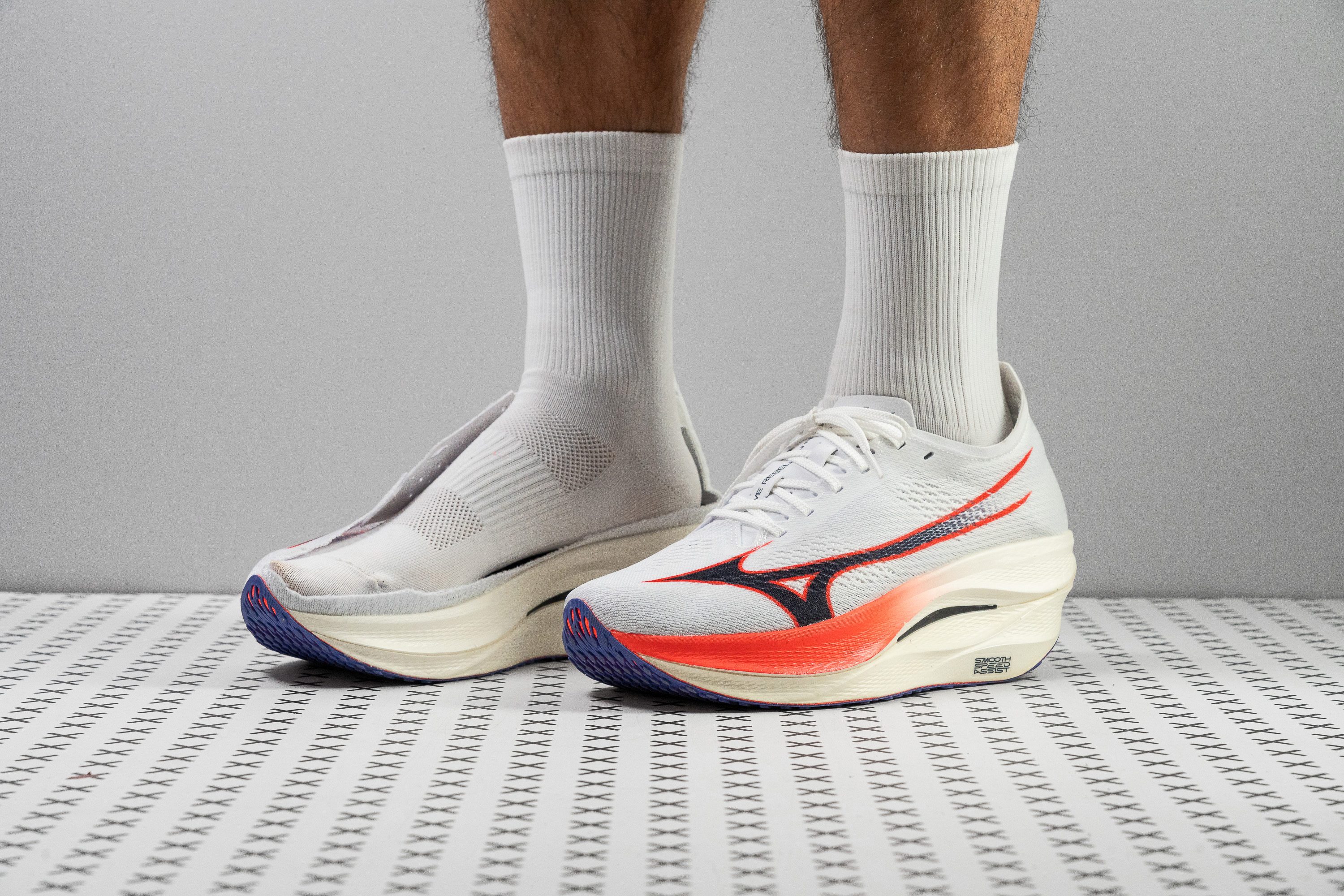













































What makes it the best?
Already in its name, Wave Rebellion Pro 3 is a one-of-a-kind rebel racer. With its unconventional geometry, crazy stack height, and light build, it delivers a uniquely enjoyable ride. Through our runs and lab tests, we discovered it's insanely responsive and is the best Mizuno race shoe for a niche market—fast and technical midfoot strikers.
At first glance and slip-on, this racer immediately stands out with its innovative design. Featuring an ultra-thick midfoot foam for comfort, it boasts the SMOOTH SPEED ASSIST technology that amplifies forward momentum. To stay within the 40-mm race-legal limit, the heel has less foam at 39.9 mm. The forefoot measures 34.5 mm, while the midfoot edges towards a staggering 61.0 mm!
We tested for the foam’s energy return and recorded above-average scores of 66.3% in the heel and 69.1% in the forefoot. In between these layers is the nylon Wave Plate for extra snappiness.
Meanwhile, every landing feels highly cushioned, with unmatched shock absorption ratings of 184 SA in the heel and 126 SA in the forefoot.
Despite its monstrous size, this racer is astonishingly light at 8.0 oz (227g), 16.3% below average.
Because of its bizarre geometry, this shoe is ideal only for a target niche: midfoot strikers. We advise forefoot and heel strikers to find a shoe that works with their natural stride.
Pros
- Record-breaking shock absorption
- Improved TPEE-based foam
- Strong traction
- Ideal for midfoot strikers
- Excellent performance in cold weather
- Yes, it's World Athletics legal!
- Great for marathon racing
- Unique look and feel
Cons
- Suited only to a specific footstrike
- Energy return still lags behind top rivals
- Heavier than most super shoes
- Needs better laces
Mizuno running shoes with the best shock absorption
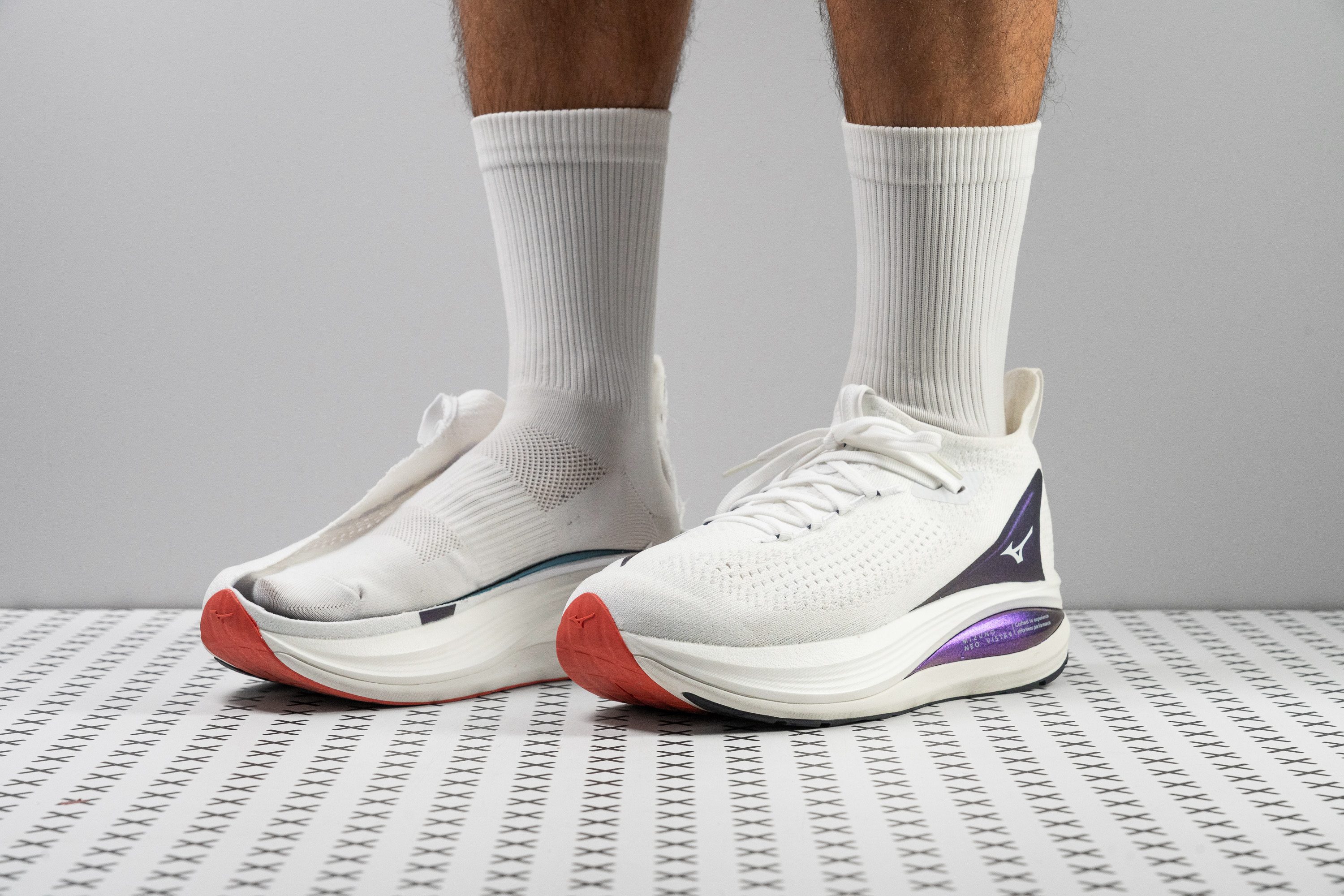
















































What makes it the best?
The Neo Vista 2 is all about protecting our joints and preventing fatigue with its ultra-padded yet light construction. Further tests in the lab confirm our impression, it offers superior shock absorption among Mizuno running shoes with its maximalist stack, airy build, and flexible midsole. It offers a rare mix of lightness and cushioning that is pure magic.
No matter how many miles we log, we can run in zen mode thanks to this shoe’s luscious midsole. Its ultra-soft nature enhances its comfort. Testing for its shock absorption, it made our jaws drop and led the pack with 170 SA in the heel and 137 SA in the forefoot! We find it to be a strong choice for relaxed or long runs.
The Neo Vista 2 is packed with lots of foam underneath, and our calliper reveals it’s a massive 46.0/37.5 mm. Its forefoot stack is even taller than the average heel cushion in our lab!
It prevents the build-up of fatigue because of its surprisingly light build. At 9.3 oz (264g), it weighs the same as average despite its maximalist nature. It also has a bendable midsole that boosts comfort for all-day wear. Our flex test validates it’s 10.0% more malleable than average.
Unfortunately, the plush foam comes at the expense of stability. Those who don’t want the heavy sinking feeling should check out another shoe.
Pros
- Massive stack height
- Super-plush Enerzy NXT foam
- Perfect for long runs
- Lightweight for its huge size
- Good durability
- Breathable knit upper
- Roomy toebox height
- Insanely fun!
Cons
- Not enough energy return
- Price hike feels unjustified
- Not stable for heel strikers
Mizuno running shoes with the best energy return
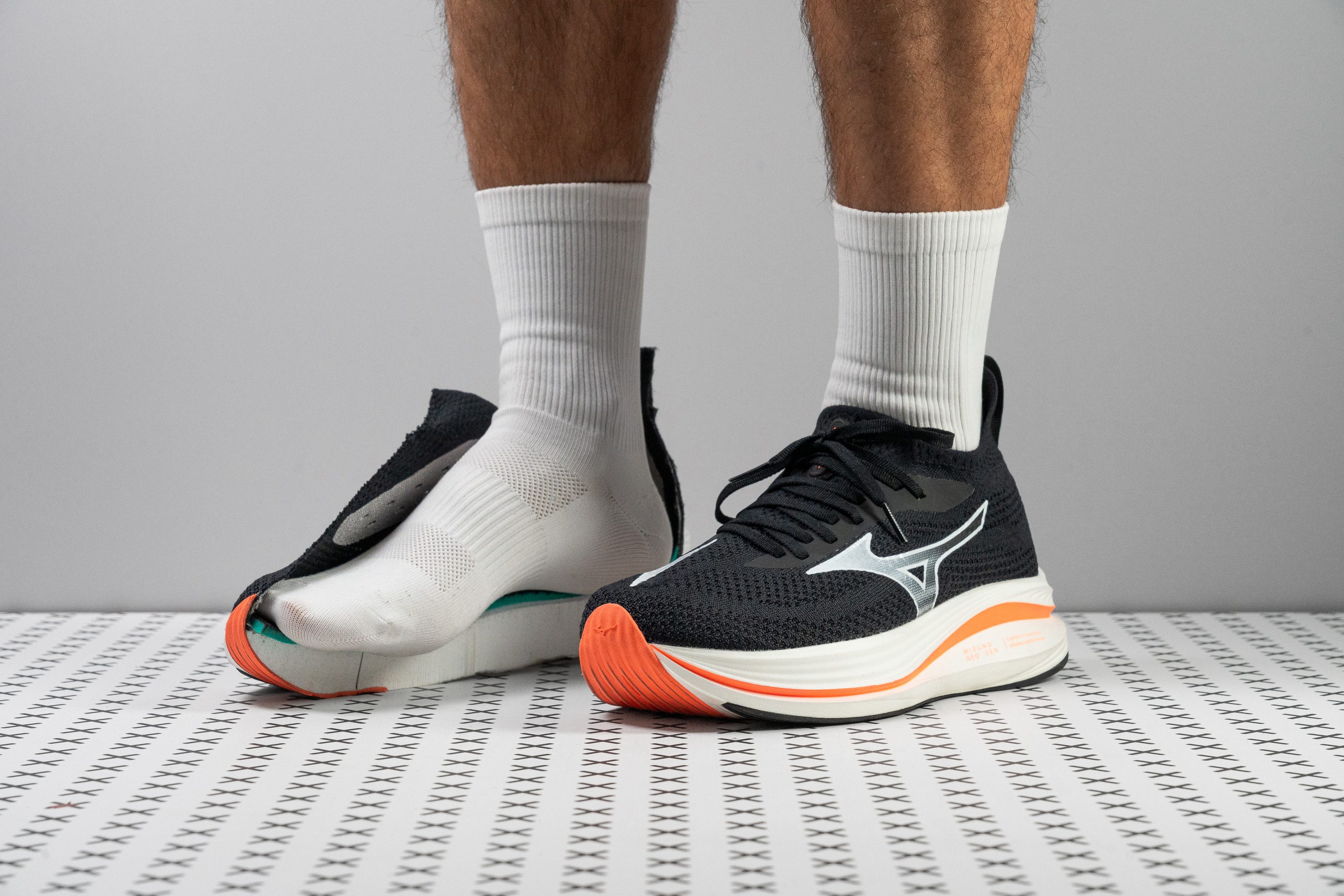


















































What makes it the best?
Our minds can stay in zen mode in the Mizuno Neo Zen because the Enerzy NXT foam did the work for us. As its name suggests and is confirmed by the lab, it offers the best energy return among Mizuno running shoes. Blending maximum impact protection with peak responsiveness in a lightweight build, Neo Zen elevates the running experience to the next level.
The Enerzy NXT midsole takes centre stage, offering solid rebound that kept us going fast! We tested for its energy return and got way above-average ratings of 71.7% in the heel and 67.7% in the forefoot. It felt really snappy underfoot, making it a strong choice for speed sessions.
The shoe is visibly tall, and our calliper confirms a skyscraper build of 41.0/34.0 mm, leaving all foot strikers with bottomless cushioning. Its ultra-soft and responsive nature enhances its comfort. Testing for shock absorption, the heel returned 158 SA and the forefoot 129 SA. For reference, the latter dampens impact 24.0% better than average.
Neo Zen can pick up faster paces because of its surprisingly light build. At 8.3 oz (234g), Neo Zen is 11.7% below average. We’re still in awe of how it combines cushioning and responsiveness in its feathery build.
But of course, there is a downside. Neo Zen’s plush foam may feel too unstable for some, notably heel strikers. Those who need more support should skip this pair.
Pros
- Plush and bouncy foam
- Feather-light for a max-stack trainer
- Fun, agile ride
- Ideal for long runs
- Solid value for performance
- Comfortable and breathable knit upper
- Toebox resist heavy wear
- Eye-catching design
- Outsole grips and lasts
Cons
- Wobbly for those needing support
- Heel sink slows rearfoot strikers
- Upper lacks padding and structure
- Enerzy NXT firms up in cold conditions
Muzino running shoes with the best stability
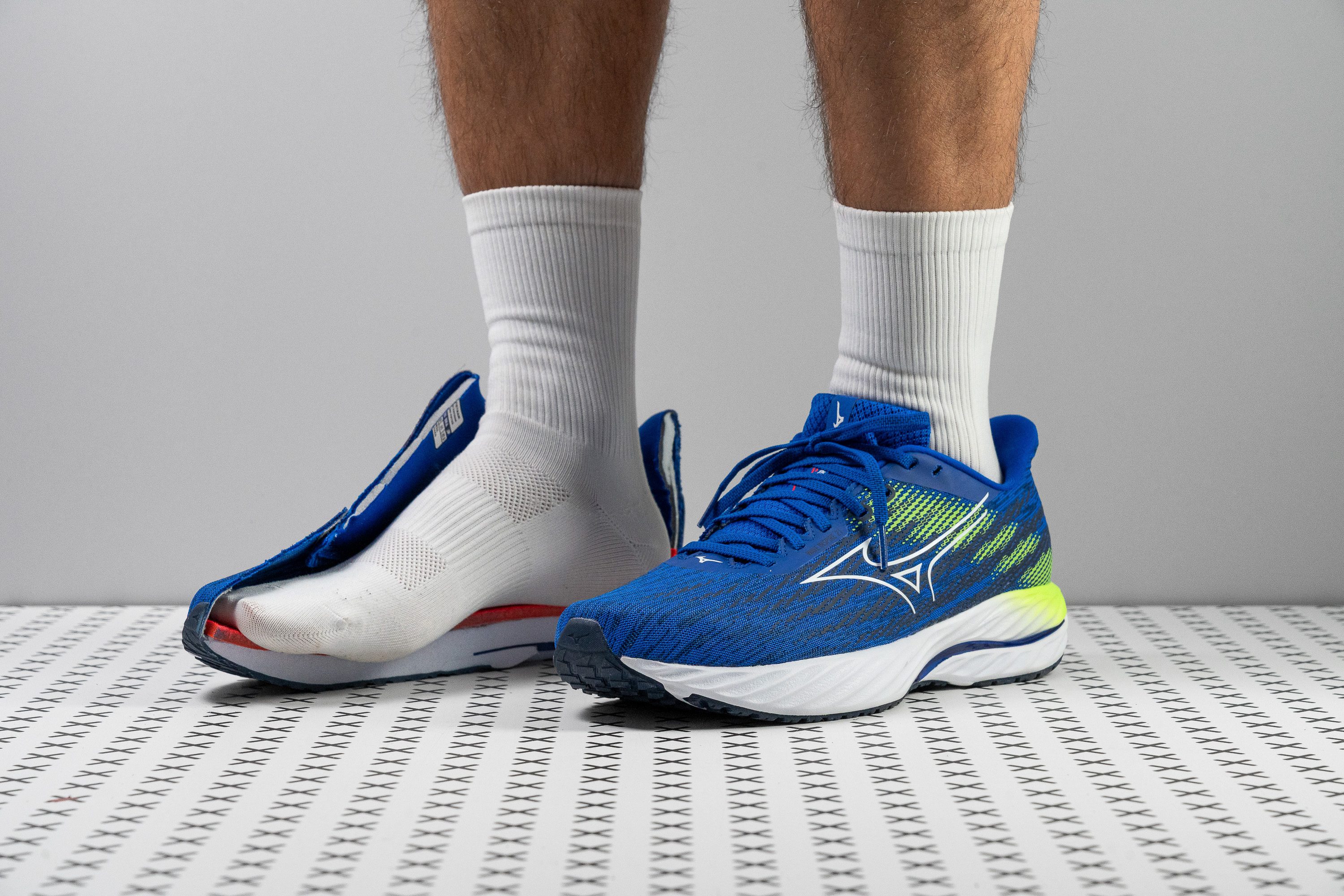














































What makes it the best?
We went on actual runs and took apart Mizuno running shoes in search of the best stability shoe—and we found the 21st Wave Inspire leads the pack. It strikes the equilibrium between comfort and support. It has elements that subtly guide us, allowing us to stride naturally. Plus, its stellar X10 rubber outsole is a perfect mix of durability and traction.
The vast 118.1/94.0 mm platform and Wave plate are the main stability features. The extra width ensures safe landings without adding intrusive elements. Meanwhile, the partial Wave plate’s positioning under our heel feels extra supportive. It prevents ankle rolls and excessive lateral movements without stiffening the ride, as proven by its 3/5 torsional rigidity mark.
Unlike most stability shoes, WI21 highlights comfort. Its loose build allows us to move freely. In our flex test, it takes 2.7% less force to bend vs. the average—impressive considering the support it delivers. Underfoot, its balanced dual-density midsole feels steady and amplifies impact absorption through its 38.0/25.1 mm stack.
Completing this package is a robust outsole that barely showed signs of wear after our runs and displayed reliable traction on wet pavements. It scored a solid 0.50 score in our friction test and showed a minimal 0.9 mm dent in our Dremel test.
We discovered a steep 12.7 mm heel drop more suited for heel-strikers. Runners seeking a more level platform should look elsewhere.
Pros
- Great choice for heel strikers
- Stable but flexible too
- Now features Enerzy NXT foam
- Durable outsole
- Good fit with gusseted tongue
- Wide platform for secure landings
- Great for everyday wear
- Fairly priced
- Weighs less than v20
Cons
- But still feels a bit heavy...
- Sky-high drop not for everyone
- Subpar airflow in hot weather
- Foam doesn't have much bounce

